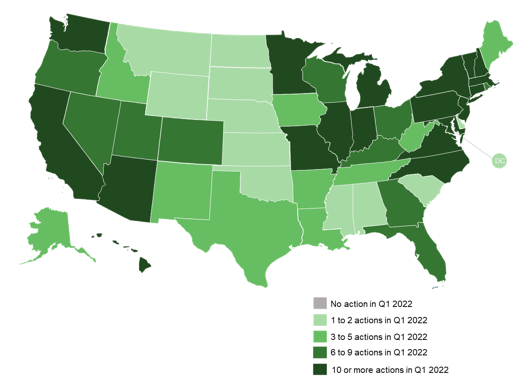The 50 States of Electric Vehicles: Federal Infrastructure Funding and Managed Charging Programs in Focus During Q1 2022
Raleigh, NC – (May 4, 2022) The N.C. Clean Energy Technology Center (NCCETC) released its Q1 2022 edition of The 50 States of Electric Vehicles. The quarterly series provides insights on state regulatory and legislative discussions and actions on electric vehicles and charging infrastructure.
The report finds that all 50 states and the District of Columbia took actions related to electric vehicles and charging infrastructure during Q1 2022 (see figure below), with the greatest number of actions relating to rebate programs, grant programs, rate design for vehicle charging, and state procurement of electric vehicles.
A total of 627 electric vehicle actions were taken during Q1 2022, with the most active states being Massachusetts, Illinois, California, New York, Minnesota, and Hawaii. Activity in these states was largely driven by numerous bills related to electric vehicles. So far in 2022, 21 states have enacted legislation related to transportation electrification.
Q1 2022 State and Utility Action on Electric Vehicles

The report discusses three trends in electric vehicle actions taken in Q1 2022: (1) states planning for federal electric vehicle infrastructure funding, (2) utilities developing active managed charging pilot programs, and (3) state lawmakers addressing charging infrastructure siting issues.
“With the passage of the federal Infrastructure Investment and Jobs Act last year, many states are taking steps to plan for the use of electric vehicle infrastructure funding that will be flowing down to the states,” said Autumn Proudlove, Senior Policy Program Director at NCCETC.
The report notes five of the top policy developments of the quarter:
- Washington lawmakers approving a light-duty vehicle electrification target;
- Utilities filing new managed charging pilots in North Carolina and Wisconsin;
- Missouri regulators approving new utility transportation electrification programs;
- The Governor of North Carolina increasing the state’s zero-emission vehicle adoption target; and
- Georgia legislators adopting a resolution to study transportation electrification.
“Utilities and regulators are examining plans to meet the needs of expanding EV charging networks and broader EV deployment. This quarter, we saw proposals for managed charging programs and targeted EV charging tariff designs,” says Vincent Potter, Policy Analyst at NCCETC.
Potter added, “The managed charging programs would give utilities information about the vehicle’s charging status and allow them to interrupt and resume charging according to larger grid demands. Tariffs that offer discounted electricity during low-use times have had some broad success and some utilities are moving to offer EV charging-specific time-of-use rates. The goal of both of these tools is to charge EVs when strain on the grid is lowest.”
View the 50 States of Electric Vehicles Q1 2022 Quarterly Report Executive Summary
View and Purchase the 50 States of Electric Vehicles 2022 Q1 Update FULL Report
View other 50 States Reports – Solar, Grid Modernization and Electric Vehicles
ABOUT THE N.C. CLEAN ENERGY TECHNOLOGY CENTER
The N.C. Clean Energy Technology Center, as part of the College of Engineering at North Carolina State University, advances a sustainable energy economy by educating, demonstrating and providing support for clean energy technologies, practices and policies. It serves as a resource for innovative, sustainable energy technologies through technology demonstration, technical assistance, outreach and training. For more information about the Center, visit: http://www.nccleantech.
MEDIA CONTACT: Shannon Helm, NCCETC, 919-423-8340